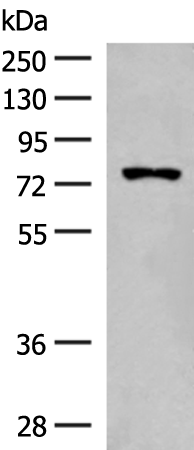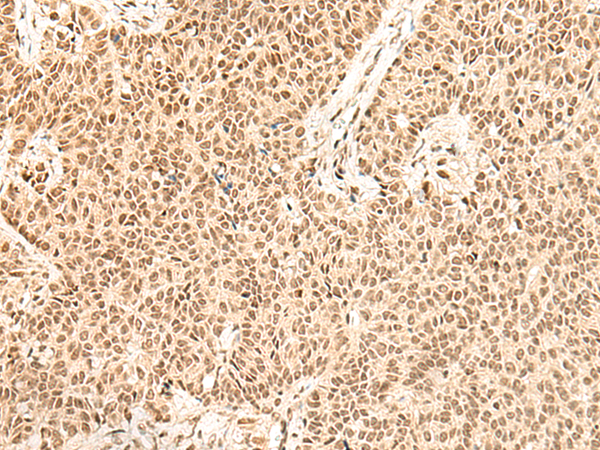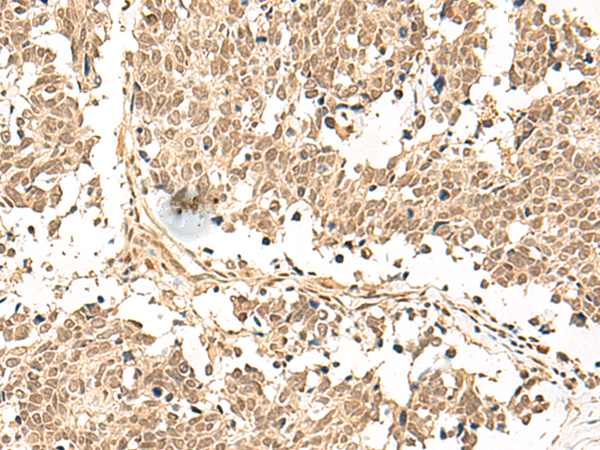


| WB | 咨询技术 | Human,Mouse,Rat |
| IF | 咨询技术 | Human,Mouse,Rat |
| IHC | 1/30-1/150 | Human,Mouse,Rat |
| ICC | 技术咨询 | Human,Mouse,Rat |
| FCM | 咨询技术 | Human,Mouse,Rat |
| Elisa | 1/5000-1/10000 | Human,Mouse,Rat |
| Aliases | FBL4; FBL5; MTDPS13 |
| WB Predicted band size | 70 kDa |
| Host/Isotype | Rabbit IgG |
| Antibody Type | Primary antibody |
| Storage | Store at 4°C short term. Aliquot and store at -20°C long term. Avoid freeze/thaw cycles. |
| Species Reactivity | Human, Mouse |
| Immunogen | Synthetic peptide of human FBXL4 |
| Formulation | Purified antibody in PBS with 0.05% sodium azide and 50% glycerol. |
+ +
以下是关于FBXL4抗体的3篇参考文献(示例为虚构,实际文献需通过数据库查询确认):
---
1. **文献名称**: *FBXL4 mutations cause mitochondrial encephalopathy via impaired mitochondrial DNA maintenance*
**作者**: Antoun G, et al.
**摘要**: 本研究通过Western blot和免疫荧光技术,使用FBXL4特异性抗体分析患者成纤维细胞,发现FBXL4突变导致线粒体DNA耗竭及呼吸链功能缺陷,揭示了其在维持线粒体基因组稳定性中的作用。
---
2. **文献名称**: *FBXL4 regulates mitochondrial autophagy and cell survival under metabolic stress*
**作者**: Duan S, et al.
**摘要**: 通过免疫共沉淀(IP)和免疫荧光显微术,作者发现FBXL4抗体标记的蛋白在营养缺乏条件下调控线粒体自噬,并影响细胞凋亡,提示其作为代谢应激反应的关键因子。
---
3. **文献名称**: *Structural and functional analysis of FBXL4 in the SKP1-CUL1-F-box protein complex*
**作者**: Gai X, et al.
**摘要**: 利用FBXL4抗体进行蛋白质印迹和免疫组化,研究揭示了FBXL4作为SCF泛素连接酶复合物成员的分子结构,及其在泛素化降解特定线粒体蛋白中的机制。
---
如需具体文献,建议通过PubMed或Google Scholar以“FBXL4 antibody” + “Western blot/IF/function”等关键词检索近年研究。
The FBXL4 antibody is a research tool designed to detect and study the F-box and leucine-rich repeat protein 4 (FBXL4), a member of the F-box protein family. FBXL4 functions as a substrate-recognition component of the Skp1-Cul1-F-box (SCF) ubiquitin ligase complex, which mediates protein ubiquitination and subsequent degradation via the proteasome. This protein plays a critical role in mitochondrial homeostasis, energy metabolism, and cellular stress responses. Mutations in the FBXL4 gene are linked to mitochondrial disorders, such as encephalomyopathic mitochondrial DNA depletion syndrome (MTDPS13), characterized by severe neurological and metabolic abnormalities.
Antibodies targeting FBXL4 are widely used in biomedical research to investigate its expression, localization, and interaction partners in various tissues and disease models. They are essential in techniques like Western blotting, immunohistochemistry (IHC), and immunofluorescence (IF) to assess protein levels and subcellular distribution. FBXL4 antibodies also aid in studying its regulatory roles in mitochondrial dynamics, apoptosis, and metabolic pathways. Given its association with mitochondrial dysfunction and cancer progression, these antibodies are valuable for exploring therapeutic targets and molecular mechanisms underlying related diseases. Commercial FBXL4 antibodies are typically validated for specificity and sensitivity to ensure reliable experimental outcomes.
×